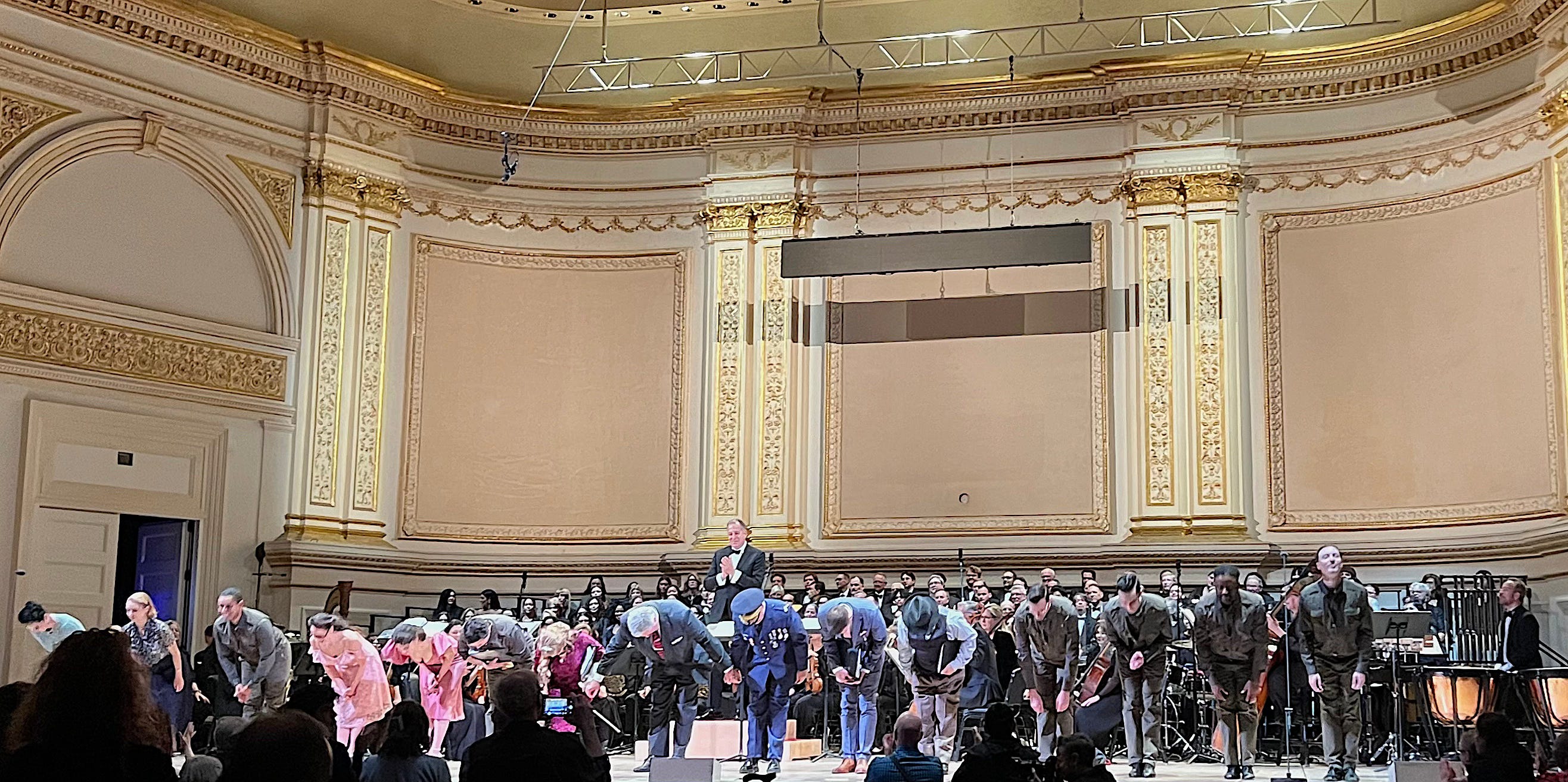MasterVoices' "STRIKE UP THE BAND"
I was really looking forward to MasterVoices’ restorational performance of Strike Up the Band at Carnegie Hall last week and I wasn’t disappointed, but I was perplexed just a bit. For good reason. Strike Up the Band is a very perplexing lost musical. It was so even for its creators.
I love a good restored “lost” musical. Among my many regrets, in terms of musical theater (I won’t bore you beyond that), are the obscurer Broadway musicals I missed basically pre-1966. Getting a shot at any one of them, restored, and in a theater, is always big news to me.
Obviously, this includes Strike Up the Band by the Gershwin brothers and George S. Kaufman (my comedic theater-writing idol), working with one of his many frequent partners, Morrie Ryskind — who also scrawled with Kaufman a good chunk of the Marx Brothers’ hilarious early stage and film business, and won a Pulitzer Prize, alongside Ira Gershwin, for their collaboration on a Strike Up the Band follow-up, Of Thee I Sing, in 1931.
Perplexities abound with Strike Up the Band. To run them down as fleetly as possible: The show was first produced for Broadway by the impresario Edgar Selwyn in 1927 as a satire of war in a period of plenty — the height of the Prohibition-juiced Roaring Twenties. But Strike Up the Band flopped, closing out of town in Philadelphia, despite the manifold talents of the Gershwins, Kaufman and Ryskind. Word was that the satire proved too biting for Broadway audiences accustomed to frivolity, though Kaufman saw it more self-critically, infamously stating: “Satire is what closes on Saturday night.”
Selwyn refused to let Strike Up the Band go. It had a delightful score, including the timelessly stentorian title song, plus “Soon,” “I’ve Got A Crush on You” and the ineffable “The Man I Love.” In 1930, Selwyn took another wack at it — now under market-crash conditions. The Gershwins sweetened their somewhat acerbic existing score just a touch (while cutting “The Man I Love,” which became a hit on its own anyway). Kaufman bowed out altogether, turning the whole revised book business over to Ryskind, who chose to denature the war itself at the heart of Strike Up the Band — originally fought with Switzerland over cheese tariffs — rewriting the show’s satirical war as a dream dreamt by the company owner. He also re-rendered Strike Up the Band’s cheese into chocolate, for curdling purposes, one supposes.
This more sugary concoction did open on Broadway and ran a very decent 191 performances in 1930.
Which leaves us where?
At Carnegie Hall.
The director of MasterVoices, Ted Sperling, assembled a terrific cast, as he always does: John Ellison Conlee as the clueless company boss; Shereen Ahmed as his sharp-edged daughter; Lissa deGuzman, scintillating as Miss Meade, the boss’s hyper-capable secretary; the sparkling Bryce Pinkham and Phillip Attmore as the ladies’ respective romantic interests; Claybourne Elder as a two-faced villain, the ever-lovin’ Victoria Clark as the inevitable wealthy dowager; David Pittu as a martinet, Colonel Holmes; and the incomparable Christopher Fitzgerald as an undercover everyman who saves the day.
This bunch sang the heck out of Strike Up the Band — whose original orchestrations were largely lost long ago (the program credited a total of seven orchestrators, old and new ). The cast also did their damndest to put over what proved to be a pretty wan, old script — rampant with creaky Marx Brothers-ish puns and cheap jibes that only Groucho and Chico could possibly sell:
SLOANE
Who's Colonel Holmes? He's the man behind the president.
FLETCHER
What's he doing back there?
And so on.
MasterVoices’ production ostensibly combined the best of the 1927 and the 1930 scripts, asssiduously reassembled by Mr. Sperling and Kaufman scholar Laurence Maslon. I’m no expert, but their focus, to me, still tilted toward the 1927 original. The 1930 hit version is pretty well documented by a reconstruction released on Tommy Krasker’s PS Classics label in 2011 that incorporated recordings commissioned by the Ira Gershwin and Leonore Gershwin Trust in 1990-1991.
MasterVoices’ vast orchestra at Carnegie Hall sounded bodacious, conducted splendidly by Ted Sperling, but it lacked some of the sprightly snap captured on the PS Classics recording that I suspect reflects the jazzier 1930 version of the show, which, let’s face it, did feature in the pit jazz giants Benny Goodman, Glenn Miller, Gene Krupa, Jimmy Dorsey and Red Nichols, fresh off their hot pit work in the Gershwins’ smash Girl Crazy the year before.
And that’s enough minutiae for me.
Honestly, I had a swell time at Strike Up the Band. The overwhelming brilliance of the Gershwins came through loud and clear, and the book made me laugh more than it made me wince, but I’m easy when it comes to corny old jokes, plus the Groucho cadences in my head remade most of them anyway.
The audacity of an antiwar musical — in 1927 or 1930 — titillates still. Moreover, Strike Up the Band led directly to Of Thee I Sing, the most pointed election musical of them all. That is, until the doozy our nation just voted itself into. Talk about lost.




